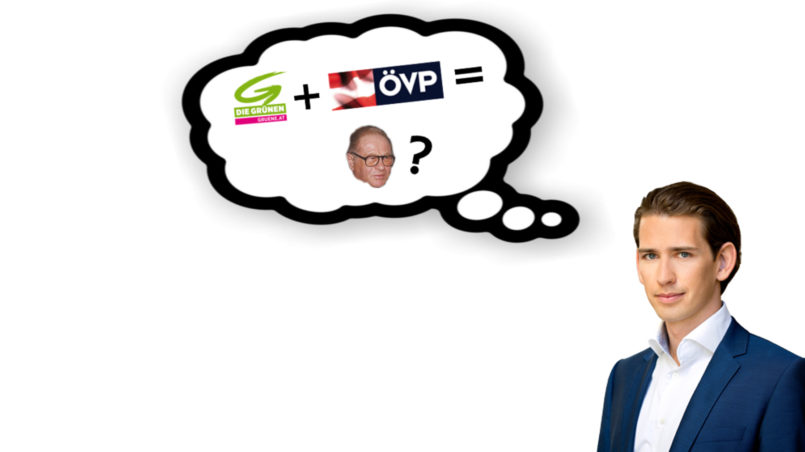The ÖVP – A black dense Cloud without Contours

Based on the huge support of ÖVP politicians for Alexander van der Bellen in the presidential election campaign, a question arises as to whether the ÖVP is acting tactically correct, remains credible and is ultimately actually helping their preferred candidate.
Christian, conservative, liberal economic: this is how the majority of Austrians remember the ÖVP. This image may still hold true for the rural population, on the municipal level. But where does the ÖVP stand in regional and federal politics?
Black-Green: Brilliant strategy or opportunistic marriage of convenience?
When the Black-Green government was formed for the first time in Upper Austria in 2003, I was not the only one who was convinced that the experiment would soon fail. However, in terms of power tactics, this experiment was a tremendous success, and the Black-Green model of state government soon spread to the majority of the Austrian federal states.
In the meantime, from a tactical perspective, this combination makes sense to me: it is ingenious from the standpoint of a power-hungry politician. But both sides had to make huge sacrifices on the altar of opportunism:
Overnight, the ÖVP had to secretly throw their entire conservative Weltanschauung overboard. The rural population should believe that the ÖVP is the only one, other than the priest, whom they can still believe in. But in the federal states the ÖVP have given the control to the Greens. And in return the ÖVP, with the approval of the Greens, are allowed to continue building streets, cableways and tunnels.
In return, the Greens have completely free rein from a socio-political perspective. An ÖVP, which could play the role of the moderate right here does not exist in the Black-Green model.
Therefore there are two winners from the coalition of ÖVP and the Greens: the functionaries of both parties, which support each other and who do not hurt one another. The loser is, however, a political landscape in Austria in which the voters no longer know where they stand.
ÖVP for Van der Bellen: A tactical error
And what is the ÖVP doing now, in the third election campaign for the Hofburg? Now the ÖVP politicians are suddenly the opposite of brilliant tacticians, they are giving their heart free rein. From east to west, ÖVP politicians are getting up and telling us in a roundabout way that we should all, please, vote for „the good in the world“ and for Alexander van der Bellen.
However, it seems to me that the ÖVP voters are totally torn as regards the presidential election. The ÖVP voters are sitting on the fence, more so than any other party. Every Hofer sympathiser in the ÖVP disregards the factual recommendation of the party. For this class, the ÖVP is now precisely in the position which they wanted to avoid: to be under the same umbrella as the SPÖ, the Greens and NEOS.
And I am convinced that, ultimately, the promotion of the Blacks does not even help Alexander van der Bellen. Election recommendations are nonsense. The time of voters doing what the party wants is over. Enough ÖVP voters would have voted for Van der Bellen anyway, and the others would not have listened to Black ex-functionaries, state governors or “village emperors”.
The great unknown: Sebastian Kurz
And if there had not been the great surprise of federal politics. Sebastian Kurz has taken many hearts by storm. Obviously he has found his very own line, he does not listen to the mainstream and, as an ÖVP Minister, has managed to escape the knee-jerk criticism which others would have collected for the same statements.
However, then the political line of the ÖVP will still not consist of their credible principles, but of one single person: Sebastian Kurz himself. We have already had parties with such an influential personality: Kreisky’s SPÖ and Haider’s FPÖ.
At the moment I fear: the ÖVP is either on the path to a lack of credibility and therefore to insignificance, or it becomes the party of “water carriers” of the next, probably only short-term Sun King, which Austria will see.
Translation into English: Donna Stockenhuber
Picture elements: Bruno Kreisky International Progress Organization CC BY-SA 3.0, Sebastian Kurz ÖVP CC BY-ND 3.0 AT
Credits
| Image | Title | Author | License |
|---|---|---|---|
 |
Kreiskys ÖVP | Patryk Kopaczynski | CC BY-ND 3.0 AT |
 |
Bruno Kreisky | International Progress Organization | CC BY-SA 3.0 |
 |
Sebastian Kurz | ÖVP | CC BY-ND 3.0 AT |
